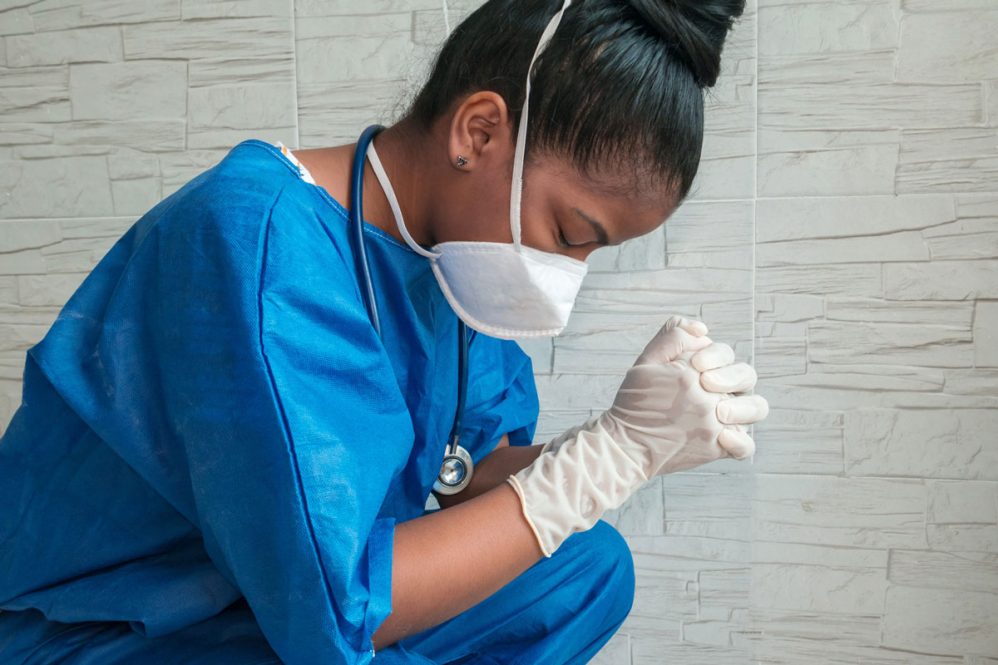Even when there isn’t an ongoing public health crisis, nursing is a profession with an abundance of challenges.
“It’s fellow RNs who know just how stressful the job is and can relate in a way that others can’t.” — Megan D'Addeo, peer responder
UConn Health nursing leadership recognized this well before the COVID-19 pandemic, laying the foundation to establish a mechanism to allow nurses to take a step back from their assignment following a challenging event and meet with a fellow nurse who is trained as a peer responder.
The pandemic put the rollout on hold, but now the Peer-to-Peer Support Program is underway, with 15 staff nurses who have volunteered to serve as peer responders.
One of them is Megan D’Addeo, who was recruited to participate by a former manager who thought she’d be interested.
“I agreed because I thought it sounded like something different that I could do to make a positive impact and improve morale,” says D’Addeo, who, shortly after graduating from the UConn School of Nursing in 2013, joined the UConn John Dempsey Hospital’s surgery and orthopedics unit as a staff nurse. “I initially went to the training in September 2019, before COVID was around, and could appreciate how much this service was needed even then. Since COVID, I think there’s an even greater need for this program as we all continue to process how much our work life has been affected.”
The concept originates from the Connecticut Hospital Association’s Safer Hospital Initiative, in recognition of the idea that nurses who are taken care of can take better care of their patients.
“The intent is to provide immediate support 24 hours a day to any nurse who experiences an adverse event or trauma on the floor,” says UConn Health Chief Nursing Officer Caryl Ryan. “It facilitates a coordinated effort for that nurse to step off the floor to meet with a trained peer responder. This responder is someone who understands the job and the emotional toll events can sometimes take.”

Lina Godfrey, who joined UConn Health as a staff nurse in 2004 and became an assistant nurse manager in labor and delivery and OB-GYN last year, says being a peer responder is about being there for her coworkers.
“It means we make the time to listen to and support each other,” Godfrey says. “On labor and delivery and OB we do this on a daily basis. Sometimes it’s as simple as giving someone a hug and sometimes it’s taking a few minutes of our time to listen and support. We are there for each other daily.”
More formally, the Peer-to-Peer Support Program provides a mechanism to arrange a confidential meeting with a trained responder, and it can be during a shift, with supervisors arranging coverage.
“Nurses invest so much emotionally in their caregiving. It’s part of what makes them so special. It can take a toll, though,” says the Rev. Catherine Wilcox, who helped organize the Peer-to-Peer Support Program while serving as UConn Health’s chaplain (now semi-retired, she works part-time in that role). “This program is a place for a nurse to go for emotional support during a shift when things get particularly tough. I hope nurses will utilize this program at those times, and ask for support when in need. There’s a great group of trained peer responders ready to offer support.”
Training is available on an ongoing basis for any nurse who would like to become a peer responder. Those interested can email Wilcox or social work supervisor Deb Feigenbaum to schedule a training session.
D’Addeo says the fact that it’s a peer offering the support rather than a counselor with a different background is what makes it effective.
“It’s fellow RNs who know just how stressful the job is and can relate in a way that others can’t,” she says. “I think it’s important for people to understand that this program isn’t intended to solve any problems or issues; for example, we can’t fix staffing/assignments or change policies. But for anyone who feels like they could benefit from talking about a challenging shift that they’re having, we’re here to help. Our goal is that by the end of the session, our coworker feels supported.”
Nurses who need additional assistance after two sessions would be referred to counseling through UConn Health’s Employee Assistance Program.
“This support that we can give our coworkers will hopefully allow them to regroup and continue with the care they are giving to our patients,” Godfrey says. “Ultimately that’s the goal: to give the best patient care to our patients at UConn Health that we can.”



